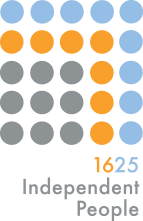

About 1625 independent people
Our services support young people to achieve their goals and aspirations through using positive trusting relationships as the primary tool for change in their lives.
1625 Independent People (1625ip) have been supporting vulnerable young people for over 30 years across the West of England. We are the South West’s largest provider of accommodation, advice and support to vulnerable young people who are leaving care, have been or are at risk of becoming homeless, are in trouble with the law or are young parents. Our specialist support ranges from preventative services through to supported housing, EET support and specialist support for young people leaving custody, care leavers and Unaccompanied Asylum-Seeking Children.
Our Vision:
“A world where all young people have a safe place and trusted adults to turn to and can access the opportunities they need”
Our Mission:
“To prevent homelessness, keep young people safe and support them to be the best they can be”.
Our overarching objective is to keep young people at the heart of what we do. We are tireless in our partnership work across sectors to make sure young people have a voice and get the support and opportunities they need and deserve.
We don’t reboot young people’s lives…
we help young people to reboot their own lives
Young people take the lead in their own lives by working with their keyworker in the design of their own support, by co-designing, delivering and evaluating our projects and by influencing policy and practice.
Many of the young people we support have experienced trauma and disrupted attachments, and as a result often struggle to trust, manage behaviours and regulate emotions. All services are underpinned by 1625ip’s Organisational Framework for Psychologically Informed Environments (PIE). Our PIE framework supports young people to move away from the effects of damaging events, so they can realise their potential. Colleagues and volunteers use trusting relationships as the primary tool for change, providing a “secure base” from which YP can develop, integrating strengths-based psychological approaches.
useful links